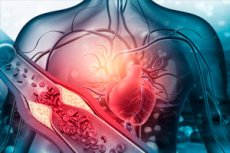New publications
A new therapy to treat organ damage caused by hypertension
Last reviewed: 02.07.2025

All iLive content is medically reviewed or fact checked to ensure as much factual accuracy as possible.
We have strict sourcing guidelines and only link to reputable media sites, academic research institutions and, whenever possible, medically peer reviewed studies. Note that the numbers in parentheses ([1], [2], etc.) are clickable links to these studies.
If you feel that any of our content is inaccurate, out-of-date, or otherwise questionable, please select it and press Ctrl + Enter.

A team of researchers led by Monash University and the Baker Heart and Diabetes Institute has published the first compelling evidence of the therapeutic potential of a new therapy to treat organ damage caused by hypertension. The paper appears in the journal Cardiovascular Research.
Hypertension and its consequences
Hypertension, more commonly known as high blood pressure, can cause damage to the heart, kidneys, and blood vessels. Current treatments are often inadequate, leaving patients vulnerable to complications such as an enlarged heart and weakened blood vessels. Addressing inflammation is key to improving outcomes and reducing associated risks.
So a team from the Monash Institute of Pharmaceutical Sciences (MIPS) and the Baker Heart Institute began investigating how a new small-molecule pro-resolving activator called compound 17b (Cmpd17b), which MIPS researchers had previously shown protects against heart attack, might also protect against organ damage caused by hypertension.
Cmpd17b Research
Through a comprehensive study involving both animal and human studies, the team of researchers uncovered the potential of Cmpd17b to reduce the harmful effects of hypertension-induced organ damage. By activating the formyl peptide receptor (FPR) family, known for its key role in regulating inflammation, Cmpd17b becomes a potent therapeutic agent capable of protecting vital organs from the damaging effects of high blood pressure.
Encouraging results
Co-lead author of the study and MIPS PhD candidate Jaideep Singh said the discovery of Cmpd17b as a potential treatment for hypertension-related organ damage was encouraging and exciting for the research team.
"Organ damage is a pathological feature of hypertension, causing significant morbidity and mortality, but current hypertension drugs are limited in treating hypertension-induced organ damage, so there is an urgent need to address this problem," Mr Singh said.
"Our team has shown for the first time that Cmpd17b not only normalizes the structure and function of the heart and blood vessels in hypertensive mice, but there is also a clear correlation with human hypertension, suggesting that Cmpd17b may be effective in clinical settings as well."
Professor Jeff Head AM, senior author of the study and director of the neuropharmacology laboratory at the Baker Institute, said organ damage from hypertension was common and remained a significant contributor to poor outcomes.
"FPRs are like bodyguards that keep inflammation in check, which is a big problem in high blood pressure. As a team, we are pleased to report that Cmpd17b, which activates these FPRs, may be a promising way to prevent and treat the damage that high blood pressure does to our organs in the long term," said Professor Head.
Important changes and potential benefits
Dr. Chengxue Helena Qing, corresponding author of the study, director of the MIPS lab and a National Heart Foundation fellow, said the study found significant changes in proteins and pathways in the hearts and blood vessels of mice with high blood pressure.
"We found that Cmpd17b, a new type of drug, can reverse some of these changes and improve heart and blood vessel health. This suggests that similar treatments might work in people with high blood pressure," Dr. Qing said.
"Using drugs like Cmpd17b may be a promising new approach to treating complications associated with high blood pressure, potentially reversing damage to organs such as the heart and blood vessels. Combining Cmpd17b with existing treatments may provide even better results in managing cardiovascular problems associated with hypertension."
